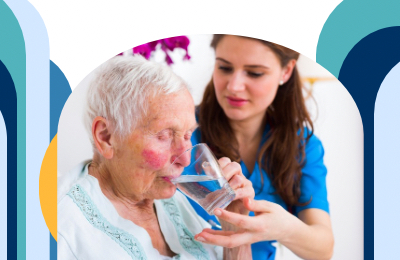Your Guide to Subject Choices for QQI Level 5 Nursing Studies (5M4349)
🩺 About This Major Award
Award Title: Nursing Studies
Award Code: 5M4349
Level: QQI Level 5
Credit Requirement: 120 credits
This programme prepares learners to work in healthcare environments or progress to nursing–related higher education. It blends theoretical knowledge with practical skills essential for client care across a range of settings.
📘 Mandatory Core Modules (Offered at Our Centre)
To achieve this award, learners must complete the following mandatory components – all of which we provide:
- Anatomy and Physiology (5N0749) – 15 credits
Studying anatomy and physiology is important for healthcare assistants and prospective nursing students, because it provides a basic understanding of how the human body works.This knowledge helps healthcare workers recognise changes in a person’s condition, and communicate changes more effectively with nurses and other healthcare professionals. It also supports safe, informed, and person-centred care by giving healthcare assistants (and nursing students) the background they need to respond appropriately to the physical needs of those they support.
- Human Growth and Development (5N1279) – 15 credits
Completing the Human Growth and Development module is essential for learners in Nursing Studies, as it offers a vital understanding of how individuals change physically, emotionally, socially, and cognitively throughout their lives. This knowledge enables future nurses to provide age–appropriate and developmentally sensitive care. It also helps them to better understand the diverse needs of patients at different life stages, promoting a more holistic and compassionate approach to nursing practice.
- Nursing Theory and Practice (5N4325) – 15 credits
The Nursing Theory and Practice module is a key component of the Nursing Studies course, as it equips learners with both the theoretical foundations and practical skills needed to deliver safe, effective, and person-centred care. Through this module, students learn about the principles and values that guide nursing practice, including ethics, communication, infection control, and patient safety. It also provides hands–on experience with essential clinical observations, helping students to build confidence and competence within this domain. The combination of knowledge and practice is crucial for preparing students to meet the demands of the nursing profession with professionalism and compassion.
- Communications (5N4690) – 15 credits
The Communications module is a vital part of the Nursing Studies major award, as effective communication is at the heart of quality healthcare provision. This module helps learners develop the skills needed to interact effectively, respectfully, and empathetically with patients, families, and healthcare teams. Good communication supports patient safety, builds trust, and ensures that care is delivered in a way that meets each person’s needs and preferences. By learning how to listen actively, give and receive information accurately, and adapt their communication style to different situations, learners are better prepared to work in diverse healthcare environments and provide compassionate, person-centred care.
🧰 Grouped Optional Modules (From Our Available Offerings)
You must select modules from each group below to fulfill award rules. Here’s what’s available at our centre:
Group 1 – Care Modules (Min. 15 Credits Required – Select one)
- Care Skills (5N2770) – 15 credits
Learners may elect to take the Care Skills module because it offers essential, hands–on experience that prepares them for real–world healthcare settings. This module teaches practical skills such as assisting with mobility, personal hygiene, nutrition, and daily living activities—core tasks that nurses and healthcare assistants perform regularly. Many learners choose this module to build confidence in their ability to care for others in a safe, respectful, and dignified manner. It also appeals to those who are passionate about providing direct, person-centred support and want to make a meaningful difference in patients’ everyday lives. The skills gained are not only valuable in clinical placements, but also highly transferable across various healthcare roles.
- Care Provision and Practice (5N2705) – 15 credits
Learners may choose to undertake the Care Provision and Practice module because it offers valuable insights and practical knowledge for those working in or preparing for roles within healthcare or social care settings. This module is particularly suited to individuals aiming to become healthcare assistants, support workers, future nurses, or social care professionals in environments such as hospitals, nursing homes, home care, community settings and day care centres. It covers essential topics including effective communication, ethical responsibilities, and person-centred care approaches. Many learners are drawn to this module to deepen their understanding of quality care practices and to strengthen their ability to provide compassionate, respectful, and professional support to those in need.
Group 2 – Work Experience Modules (Min. 15 Credits Required – Select one)
- Work Practice (5N1433) – 15 credits
The Work Practices module involves a more extended placement – lasting a minimum of two months – to give learners a deeper understanding of the healthcare environment. This module focuses on professional behaviour, teamwork, time management, and following workplace policies and procedures. During this time, learners are expected to reflect on their experiences, identify learning goals, and take on greater responsibility in their role. It helps them build real–world competence and prepares them for the expectations of full–time employment in the healthcare sector. The module also encourages personal development and a strong sense of accountability in care delivery.
- Work Experience (5N1356) – 15 credits
The Work Experience module gives healthcare learners the opportunity to apply their learning in a real healthcare environment. Over the course of at least 110 hours placement, learners complete practical and hands–on experience in settings such as nursing homes, hospitals, community settings or home care services. This placement allows them to develop practical care skills, observe professional standards, and understand the day–to–day responsibilities of a healthcare worker. It also helps build confidence, communication skills, and a greater awareness of the needs of service users. Completing this module is essential for bridging the gap between theory and practice.
Group 3 – Optional / Elective Course Modules (Pick two to Reach 120 Total Credits)
- Social Studies (5N1370) – 15 credits
The Social Studies module is useful for healthcare workers as it helps them understand the broader social factors that affect the lives of the individuals they care for. By studying sociology, social stratification, and the impact of discrimination, healthcare workers can gain deeper insight into how factors like class, gender, race, and cultural background influence a person’s health and well–being. Understanding socialization and the role of family and community helps healthcare assistants build stronger, more empathetic connections with service users, considering their social context and needs.
- Care Support (5N0758) – 15 credits
Studying care support is an important part of training for Healthcare Assistants and aspiring nursing students, as it helps develop the understanding, attitude, and approach needed to provide meaningful and effective care. This subject focuses on the emotional, psychological, and social aspects of supporting people who may be vulnerable, elderly, ill, or living with disabilities. It teaches healthcare workers how to build positive relationships with service users, promote independence, and support their dignity and choices in day–to–day life.
- Intellectual Disability Studies (5N1652) – 15 credits
Learners who study Intellectual Disability Studies to gain a better understanding of the needs, abilities, and rights of individuals with intellectual disabilities. This course module helps them learn how to provide respectful, person-centred care that promotes independence, dignity, and inclusion. It also covers the social and medical models of disability, effective communication strategies, and how to support individuals in daily living while recognising their unique strengths. By studying this subject, healthcare workers (and prospective nursing students) are better prepared to support individuals with intellectual disabilities in a compassionate, empowering, and professional manner across various care settings.
- Safety and Health at Work (5N1794) – 15 credits
Learners undertaking the Nursing Studies major award may choose the Safety and Health at Work module as an elective to strengthen their understanding of how to maintain a safe and healthy environment in healthcare settings. This module equips students with the knowledge and skills needed to identify workplace hazards, understand health and safety legislation, use personal protective equipment (PPE), and apply safe manual handling and infection control practices. It also prepares learners to respond appropriately to emergency situations. Choosing this module can help nursing students reduce risks, promote safety, and ensure their future practice aligns with national standards and legal requirements—key aspects of delivering responsible and high-quality patient care.
- Nutrition (5N1794) – 15 credits
Learners completing the Nursing Studies major award may choose the Nutrition module as an elective to develop essential knowledge about the role of diet in supporting health and recovery. This module is particularly beneficial for those preparing to work in healthcare settings, where understanding nutritional needs is vital—especially for individuals affected by age, illness, or medical conditions. By studying nutrition, learners gain the skills to understand nutritional needs and suitable meal options for clients with a variety of needs. This enhanced understanding contributes to more effective, person-centred care and aligns with the holistic approach central to nursing practice.
- Care of the Older Person (5N2706) – 15 credits
Studying Care of the Older Person is essential for upcoming and current healthcare and nursing students because a significant part of their role often involves supporting older adults. This module helps healthcare workers understand the physical, emotional, and social changes that come with ageing, as well as common age–related conditions such as dementia, arthritis, and reduced mobility. It also emphasizes the importance of promoting independence, dignity, and respect in every aspect of care.
By studying this subject, aspiring healthcare workers learn how to meet the specific needs of older people in a safe, compassionate, and person-centred way. It also helps them develop greater empathy and awareness of the challenges faced by older adults, enabling them to provide support that improves quality of life and encourages positive ageing. This knowledge is vital across a range of care settings, including nursing homes, hospitals, and community settings.
- Biology (5N2746) – 15 credits
Learners undertaking the Nursing Studies major award may choose the Biology module to deepen their understanding of the biological principles that underpin human health and disease. This module explores key topics such as cell structure and function, genetics, microorganisms, and the role of pathogens in infection—knowledge that is highly relevant to nursing practice. Through hands–on experiments and investigations, learners also develop practical scientific skills, including accurate reporting and laboratory safety. The Biology course module provides foundational understanding, therefore making it a valuable elective for those entering the healthcare/ nursing field.
- Infection Prevention and Control (5N3734) – 15 credits
Infection Prevention and Control is a vital course module for both upcoming and current healthcare workers, as it equips them with the knowledge and skills needed to minimise the risk of infection in care settings. Healthcare workers often care for individuals who are more vulnerable to illness, making it essential to maintain the highest standards of hygiene and safety. A key focus of this module is the use of standard precautions—including hand hygiene, the correct use of personal protective equipment (PPE), safe handling of waste, and proper cleaning practices.
These precautions are critical not only in protecting service users, but also in safeguarding healthcare workers and visitors from potential infection. By applying these practices consistently, healthcare workers and prospective nursing students help prevent the spread of harmful bacteria and viruses, ensuring a safer and healthier environment for everyone involved in the delivery of care.
- Palliative Care Support (5N3769) – 15 credits
The Palliative Care course module focuses on providing specialized care for individuals with life–limiting or terminal illnesses. It teaches healthcare workers how to manage symptoms, improve the quality of life, and offer emotional, psychological, and spiritual support to both the patient and their family. The course covers important aspects such as physical care support, communication skills for discussing sensitive topics, and supporting patients through their palliative journey. Healthcare workers also learn to address the physical, emotional, and social needs of patients in a compassionate, respectful, and person-centred manner. Overall, the course equips healthcare workers with the knowledge and skills necessary to offer dignified and holistic care to those throughout their palliative journey.
🧮 Sample Subject Combinations (120 Credits Total)
Here are two sample pathways to help you plan your modules:
➤ Example 1 – General Nursing Prep
- Mandatory 4 Modules (A&P, HGD, Nursing Theory, Communications)
- Care Provision and Practice (5N2770)
- Work Practice (5N1433)
- Infection Prevention and Control (5N3734)
- Nutrition (5N2006)
➤ Example 2 – Elder Care Focus
- Mandatory 4 Modules (A&P, HGD, Nursing Theory Communications)
- Care Skills (5N2770)
- Work Experience (5N1356)
- Palliative Care Support (5N3769)
- Care of the Older Person (5N2706)
🎓 Progression Opportunities
With the 5M4349 Major Award, you can apply to:
- QQI Level 6 Advanced Healthcare or Nursing–related courses
- Nursing degrees through CAO (via QQI/FETAC routes – e.g., General Nursing, Psychiatric Nursing)
- Employment as a Healthcare Assistant, Home Support Worker, or Nursing Home Carer
🔍 Tips for Choosing Subjects
- ✅ Choose based on your career goal: e.g., elder care, hospital setting, mental health.
- ✅ Ensure credits add to 120.
- ✅ Take advantage of high-demand modules like Infection Control and Nutrition.



















